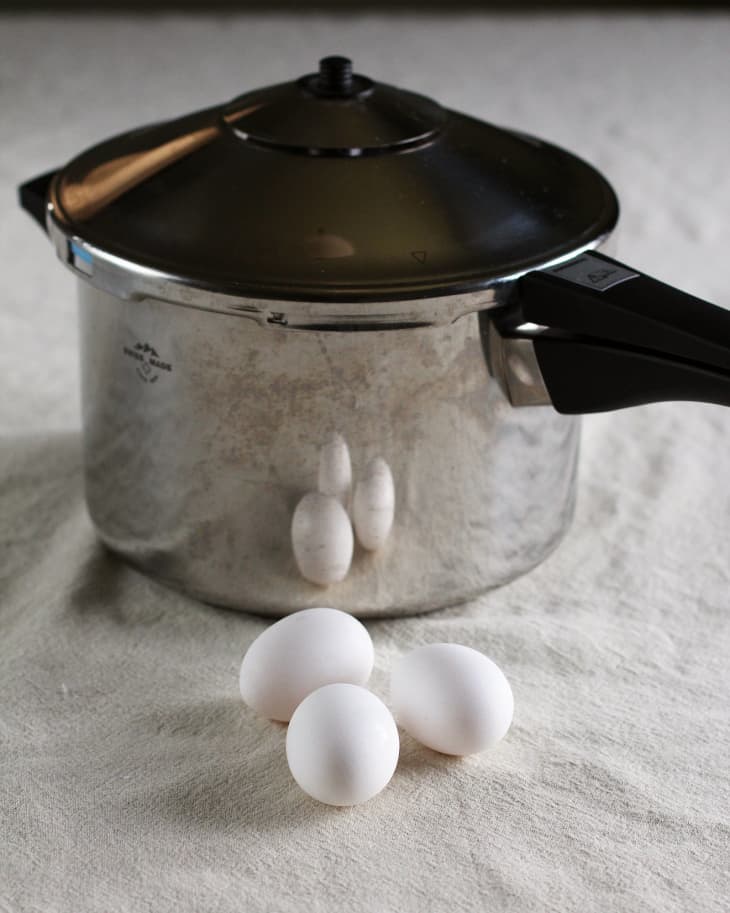Is the Best Way to Make Easy-to-Peel Eggs in the Pressure Cooker?
Last week I took a look at whether or not adding baking soda to the boiling water makes hard-boiled eggs easier to peel and found that, unfortunately, it didn’t seem to make a difference. So are there any tricks that do work?
You had plenty of ideas in the comments and on Facebook, but the one that intrigued me most was the suggestion to use a pressure cooker. Several readers mentioned that hard-boiled eggs cook faster in the pressure cooker and that even fresh eggs peel perfectly every time. I had to give the technique a try.
The Original Tip
This method comes from Laura Pazzaglia of Hip Pressure Cooking, who found out that commercially hard-boiled eggs are steamed at low pressure to make them easier to peel. She did some testing in her kitchen and came up with a method for cooking soft, medium and hard “boiled” eggs in the pressure cooker at low pressure (6 to 8 PSI).
She explains that hard boiled eggs cooked this way are exceptionally easy to peel because the cooker creates a pressure difference between the exterior of the egg and the air pocket inside, which inflates and separates from the egg white.
This air pocket will increase in size naturally as an egg ages, which is why you always hear that you should let your eggs sit in the fridge for a week before boiling them, but since the pressure cooker can do it in minutes, Laura says even very fresh eggs will peel very easily when cooked this way.
→ See the original tip: CRACKED! Soft, Medium, and Hard “Boiled” Eggs in the Pressure Cooker – Hip Pressure Cooking
Laura also wrote a guest post about the process on Michael Ruhlman’s blog:
→ The Egg and the Pressure Cooker – Michael Ruhlman
The Testing Method
To test this technique, I used eggs I had purchased from the farmers market the day before. Laura’s post calls for extra-large eggs, but I used large, and I didn’t find that I had to adjust the cooking time.
The eggs go straight from the fridge into a pressure cooker outfitted with a steamer, so the eggs are not directly touching the water, and the cooker is brought up to LOW pressure (8 PSI on my pressure cooker). Cooking eggs at high pressure will cause them to crack and leak, so it is important to stay close by and keep an eye on the pressure as the eggs cook.
Cooking only takes 6 minutes once low pressure is reached, and then the pressure is brought back down through the natural release method. I then immediately cooled my eggs under cold running water for about one minute before peeling them.
The Results
…Perfectly cooked, easy-to-peel eggs every time!
I tried this method several times and each time the eggs practically fell out of half their shells — you can actually see the big pieces of intact shell in the photo above — leaving perfectly smooth eggs that were cooked just how I like them. (I like a little bit of softness to the center of the yolk; you may need to experiment to find the cooking time that is just right for you.)
Verdict: This is a mind-blowing tip.
Final Notes
Laura says you can hard-boil as many eggs as will fit in your pressure cooker with this method, making it ideal for a big batch of deviled eggs or next year’s Easter eggs. But it’s also quicker and uses a lot less water than traditional hard-boiling, making it a great method for quick weekday breakfasts as well.
If you want to try it yourself, definitely read the full instructions on Hip Pressure Cooking, which go into far more detail than I do here, and also include a tip for making a DIY heatproof egg stand for pressure-steaming eggs.
→ Get the full tutorial: CRACKED! Soft, Medium, and Hard “Boiled” Eggs in the Pressure Cooker – Hip Pressure Cooking
